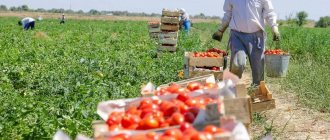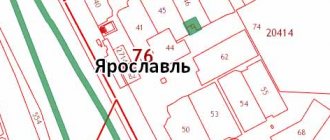What is personal subsidiary farming?
Private household plots are one of the forms of conducting non-entrepreneurial activities for cultivating land to obtain products for personal consumption. According to the law (Federal Law No. 112 of July 7, 2003), private household plots are classified as non-profit activities if members of the same family are employed in it.
Attention! You can open a private plot on agricultural land by renting or purchasing a plot of land. From this moment on, you can safely engage in gardening, cattle breeding, etc. Private household plots are not subject to registration.
The permissible size of a land plot for running a personal subsidiary plot (maximum and minimum area) for this type of activity is determined by the standards of the administration of the village or district.
By virtue of Law No. 119-FZ dated 01.05.2016 (with amendments and additions that entered into force on 01.01.2017) “On the specifics of providing citizens with land plots that are in state or municipal ownership and located on the territories of the constituent entities of the Russian Federation that are part of Far Eastern Federal District, and on amendments to certain legislative acts of the Russian Federation", the above-mentioned limits on the size of plots for private household plots do not apply in cases of provision of plots in the territories:
- Republic of Sakha (Yakutia).
- Kamchatka region.
- Primorsky Krai.
- Khabarovsk Territory.
- Amur region.
- Magadan region.
- Sakhalin region.
- Jewish Autonomous Region.
- Chukotka Autonomous Okrug.
The activities of private household plots have a number of features , including:
- free from requirements for individual entrepreneurs;
- does not require reporting;
- at the output of private household plots, products are obtained to satisfy their own needs and, if desired, the surplus can be put up for sale.
To receive land as a private plot, you must submit an application to the administration, indicating your personal passport details and information about the plot (area, grounds for ownership). After approval, it will be possible to obtain a site diagram from the design organization.
The transfer of ownership begins with a resolution of the head of the district administration . Then the cadastral chamber assigns a number to the plot and draws up a plan. Based on these and documents already in hand, the executive committee confirms ownership. Its registration takes place at the regional registration chamber.
After this, the owner has every right to engage in activities:
- Grow crops.
- Maintain an apiary.
- Install greenhouses of any size.
- Raise animals and poultry.
What does registration of private household plots give?
The law states that state support is one of the components of running private household plots.
Help includes:
- organizing infrastructure and facilitating the creation of cooperatives that will help in the maintenance, processing and marketing of products;
- creating conditions for development (we are talking about interest-free loans and equipment rental);
- carrying out various activities to improve the meat qualities of animals;
- organization of animal insemination;
- free inspection of livestock by veterinarians.
But regardless of whether the state decides to support the activity, small landowners initially feel the advantages of running such a business.
Advantage 1. Possibility of selling products
Owners have the right to freely sell surplus vegetables, fruits, meat, etc. The only condition is that only family members can be involved in growing and caring for plants and animals.
Private household plots as a business idea for beginners - a detailed article to delve deeper into the topic.
Advantage 2. No taxes!
Private household plots are not registered with the tax authorities, that is, they are exempt from reporting. Accounting is carried out by local authorities, entering information into the household ledger provided exclusively by the owner. The only mandatory tax is on land.
Advantage 3. Opportunity to take part in the state support program
Subsistence farming is subject to state support, prescribed in the legislative framework for agricultural producers. For such assistance, money is allocated from the budgets of the Russian Federation at different levels.
Government agencies also develop and implement programs to simplify the management of private household plots.
How to get a loan for private household plots or a grant for agricultural development - read in special articles.
Advantage 4. Protection from unexpected visits from sanitary services
In Art. 4 clause 2 of Law No. 112-FZ states that land provided by the state must be used in compliance with sanitary and hygienic standards. At the same time, there is no law regulating the right to organize inspections by sanitary services.
Rights and obligations of the owner
Owners of private household plots have the following rights:
- Inherit and bequeath.
- Create an individual entrepreneur and register other legal entities.
- Make transactions that do not contradict the law.
- Have property and personal non-property rights.
- Erect houses, buildings, structures, structures (within the framework of the law on this type of economy). You can find out more about what is possible to build on the lands of private household plots and for the construction of which objects a permit is required here.
- Fence the area to prevent third parties from entering it.
Responsibilities:
- Do not cause damage to the earth and the surrounding nature.
- Make payments on time and in full.
- Maintain real estate on the site in accordance with architectural, planning, construction, environmental, sanitary and hygienic, fire safety and other established requirements, norms, rules, regulations.
- Use the land plot for its intended purpose for 3 years.
What documents will be needed
Registration of land for private plots requires going through several stages, which are described above, and each step requires its own package of documents.
We provide a list of all the papers that may be useful in various government agencies during the registration of the allotment:
- Passport.
- Application for registration (issued at the mayor's office).
- Information (schemes, plans) about plots that are already owned.
- Passport for allotment.
- A document indicating the cadastral number of the land plot.
- Act of the executive committee on the assignment of an allotment to a citizen.
- An extract from the household register stating that the private household plot is registered with the local administration.
Where to obtain documents is described in step-by-step instructions.
If you need a detailed business plan for private household plots, read the special publication on our portal.
Veterinary, sanitary and other standards for content
Birds
Veterinary rules for keeping poultry were approved by order of the Ministry of Agriculture of the Russian Federation dated April 3, 2006 No. 103.
Different types of poultry should be housed in different areas of the building . Walking areas for different types of birds should be individual. Made from materials that can withstand cleaning and disinfection. Floors must be durable, durable and made from materials that are resistant to constant drainage and disinfectants. Ventilation must be provided to create an optimal microclimate in the premises for birds.
Veterinary and sanitary procedures:
- The premises must be washed regularly, and equipment (feeders, perches, drinking bowls) must be disinfected.
- The bedding material in the premises should consist of sawdust, wood shavings, etc. The use of frozen, moldy, or damp bedding material is prohibited. It is usually laid on a layer of lime - fluff 10-15 cm thick.
- Windows and doors are equipped with frames with mesh to prevent wild birds from entering the premises.
- It is recommended to work with poultry in clean overalls and shoes.
Pigs
Veterinary rules for keeping pigs were approved by order of the Ministry of Agriculture of the Russian Federation dated March 29, 2021 No. 114.
- It is necessary to provide the area with a fence to prevent other animals from entering. With a livestock of 5 heads, the minimum distance from the corner of the pig-breeding premises to the border of the neighboring plot should be at least 10 meters, with 15 heads - at least 40. For a certain type of pig, it is necessary to provide a certain area m2.
- Disinsection, decontamination and deratization of pig-breeding premises are carried out at least once a year.
- Feed must be heat treated for at least 30 minutes after boiling.
- Drinking water must be used as food for animals.
- Pigs kept on farms are subject to diagnostic tests, vaccinations and treatments against infectious diseases in accordance with the Epizootic Action Plan.
Cattle
The rules for keeping cattle are regulated by order of the Ministry of Agriculture of the Russian Federation dated December 13, 2021 No. 551.
- The food must meet veterinary requirements. The stock of feed should be kept in the amount required for each head for 30 days in advance. Milk – for 1 day. Powdered milk - for at least 15 days.
- Hay, straw, silage, etc. – for 1 stall period.
- For drinking, you must use clean drinking water.
- Pastures must be located at least 2.5 km away. from a watering hole.
- Cattle must be housed in sections or stalls. The sections must be arranged in such a way as to ensure unhindered exit from them. Different types of cattle need to be kept in different rooms (of the same or different buildings).
Legal sale of products
According to the Federal Law on Personal Subsidiary Farms, the sale of products produced on the lands of private household plots does not relate to entrepreneurial activity.
You can sell your products grown on the site in markets , as well as by concluding a cooperation agreement with restaurants, cafes and other catering establishments. But to do this, it must undergo a certain examination for compliance with standards, and with ready-made documents and certificates in hand, the owner of the product can sell it for use by other people.
- documents confirming compliance with the mandatory requirements of regulatory documents (copies of the certificate or declaration of conformity);
- veterinary accompanying documents: veterinary certificate form No. 2 (for transportation from another region (city);
- veterinary certificate form No. 4 or a stamp of the state veterinary service in the shipping document (for transportation within the district (city);
- for meat, in addition to the above: the conclusion of the state laboratory of veterinary and sanitary examination, allowing the sale of meat on the market.
To protect yourself from the persistent attention of the Tax Service, you need to obtain a document from the local administration stating that this particular product was produced in this particular area. Next, it is advisable to register the private household plot in the household register.
To do this, indicate:
- Full name, date of birth of the owner of the land plot, as well as the full name of all family members living with him.
- Number of animals, bees or birds present.
- The area of land occupied by crops or plantings.
- the number of units of agricultural machinery and vehicles involved in the processing and creation of products.
You can find out more about how to open a private household plot and what taxes the owner expects here.
Timing and cost
It remains to add that all of the above papers must be submitted to the registration authorities within a week from the moment of moving.
The processing time for a passport with a mark on the new registration should not exceed three days.
Just 11 years ago, for such a new stamp, citizens of the Russian Federation paid the state a fee in the form of one percent of the minimum wage.
Today, obtaining permanent residence for Russian citizens costs nothing. The state fee for registration in the Russian Federation in the amount of 350 rubles is paid only by foreign nationals and stateless persons.
You can learn how to register at your place of residence through the MFC or at the passport office from our articles.
Is it possible to register on these lands?
The construction of buildings and registration in a house erected on the lands of private household plots falling under the category of urban settlements is possible. If the land belongs to the category of agricultural or field land, then no. The construction of residential buildings and registration in them are excluded according to the law “On personal subsidiary plots”, Article 4.
Important! Housing is recognized as suitable for registration and residence only after the project is put into operation and registered in the state register.
Before applying for registration in the house, you must prepare a package of documents :
- Application with a request to register a citizen.
- Citizen identification documents.
- House book or extract from it.
- Consent of the property owner.
- Registration certificate of the house.
- Title documents for the house.
- Power of attorney (if it is impossible for a citizen to appear in person).
To run a farm, registration on private household plot lands is not required.
Where to begin?
How to register in the village? To register for any residential premises, regardless of location, you must obtain the consent of the owner .
In rural areas the order is the same.
If the person being registered is not the owner of the house , then you need to enlist the support of the latter.
Next, you can check the availability of all papers. If something is lost, restore it. After this, you can proceed directly to registration.
Find out on our website about the rules and procedure for registration in a privatized, municipal or mortgaged apartment, as well as how many people can be registered in one residential premises, and how the number of registered persons will affect the amount of the rent.
How to get loans?
Like any business, running private household plots requires serious financial costs : purchasing equipment, constructing premises, purchasing animals for breeding, etc. There may not be any free finance available to a citizen. In this case, the bank can come to the rescue. In order to receive a loan, the following conditions must be met: the client must be a citizen of the Russian Federation and already own the land plot on which the farm is run.
To draw up a contract you need:
- citizen's identity document;
- questionnaire and application;
- extracting their household register;
- military ID (for men under 27 years old);
- documents confirming employment and solvency;
- documents on the security provided (collateral);
- invoices, checks, payment documents indicating the intended use of the funds received (payment for services, purchase of goods, equipment, livestock, etc.).
The loan is given for a period of 2 to 5 years.
Pension insurance
Article 9 of Federal Law No. 112-FZ dated 07/07/2003 grants citizens with the right to voluntarily enter into legal relations for compulsory pension insurance in accordance with the legislation of the Russian Federation.
Since January 2013, amendments to Article 29 of Federal Law No. 167 “On Compulsory Pension Insurance in the Russian Federation” came into force on the right of owners of private household plots to make contributions to the Pension Fund of at least 150 rubles per month. This will allow you not to be left without a pension when the time comes. It will be unfair: a person works by the sweat of his brow in agriculture, the state does not know about this, and by the time the person is left without support due to old age. The above-mentioned law allows you to avoid such situations.
What are the features of registration of private household plots?
Let's start by defining what personal subsidiary plots are. This will help you understand its nuances.
Law No. 112-FZ defines private household plots as a form of non-entrepreneurial activity that allows the production and processing of agricultural products.
Everything that citizens grow belongs exclusively to them. When selling crop products or, for example, poultry, the owner will not be “convicted” of being an entrepreneur. Such actions are regarded as getting rid of surplus.
The main feature is that it works without registering as an individual entrepreneur. You can conduct any activity on your own or leased land after obtaining permission in the form of ownership or lease rights. There are two types of sites for organizing work: personal and field.
The advantage of plots located within the boundaries of a populated area is the opportunity not only to breed livestock and grow fruits and vegetables, but also to build a residential building here. While the field is exclusively the production of agricultural products. No buildings except greenhouses can be erected here.
Registration of land is mandatory if it is state property and has been specially allocated for subsistence farming. Thus, the owner will legitimize use.
Is it possible to build on a plot for private farming?
On agricultural lands, only buildings intended for seasonal use or technical buildings necessary for conducting economic activities can be erected. Capital constructions are possible only when conducting farming activities .
Attention! The lands of settlements on which it is possible to establish individual housing construction or private subsidiary plots are suitable by law for the construction of residential buildings of no more than 3 floors with the possibility of subsequent registration in them.
You can read more about whether it is possible to build a house on the lands of private household plots and what is needed for this here.
Features of taxation of private household plots
Goods grown on subsistence land are not taxed. The only mandatory payment is land tax. It is 0.3% of the cost of the plot. Also, owners are not required to contribute funds to a pension fund. They decide for themselves when and in what amount to transfer money to the government organization.
It’s possible to register a house on a private plot
Since the state does not require registration of individual entrepreneurs, there is no need to submit accounting reports either. And the owner of the site has the opportunity to employ all family members.
Such tax exemption is possible only in case of running a subsidiary farm according to the law:
- an allotment of no more than 0.5 hectares in size - restrictions are prescribed by Law No. 112-FZ;
- Only family members are involved in the production and processing of products; hiring employees is a violation of the law.
In some cases (need to be checked with the local administration), the maximum size of 0.5 hectares can be increased 5 times.










